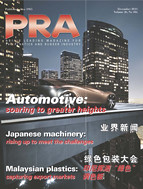 |
 |
In this Edition December 2011 |
LEAD FEATURE |
COMPANY NEWS |
MATERIALS NEWS |
MACHINERY NEWS |
INJECTION MOULDING ASIA |
RUBBER JOURNAL ASIA |
PRA December 2011 Electronic Issue Now Available |
Company News
Shell pilots new PC process and enters into Middle East jv
 |
The scope under consideration of the Middle East joint venture project includes a world-scale steam cracker, with feedstock coming from natural gas projects in Qatar; a mono-ethylene glycol plant of up to 1.5 million tonnes/year using Shell's proprietary OMEGA (Only MEG Advantaged) technology; 300 kilotonnes/year of linear alpha olefins using Shell's proprietary SHOP (Shell Higher Olefin Process) and another olefin derivative. The complex will produce cost-competitive petrochemicals products to be marketed primarily into Asian growth markets. Qatar Petroleum will have an 80% equity interest in the project and Shell 20%.
The agreement comes on the heels of another partnership with Qatar Petroleum, having recently inaugurated Pearl GTL. Qatar Petroleum and Shell have delivered Pearl Gas-to-Liquids (GTL) and Qatargas 4 this year; two of the world's largest projects built in Ras Laffan Industrial City.
Meanwhile, Shell will start up a 500-tonne/year pilot unit to manufacture the chemical intermediate diphenyl carbonate (DPC). The unit will be located at Shell's chemical plant in Singapore's Jurong Island. It will manufacture sufficient volumes of DPC via a proprietary process to supply selected customers in the PC industry for their evaluation and acceptance.
Shell's production of DPC is phosgene-free and is expected to have advantages in terms of cost, safety, efficiency and CO2 footprint. The patented process comprises a number of innovative approaches in design and catalysis. Phosgene is a highly hazardous material that requires stringent safety procedures and requires a complex process with critical manufacturing issues, such as waste disposal, environmental drawbacks, capital and energy intensity. In recent years, DPC has replaced phosgene and now almost all PC units use DPC as feedstock.
Shell has also developed innovative transport solutions beyond the current industry supply model to be able to supply DPC to customers wherever they choose to invest in PC. In Shell's newly-patented supply chain, DPC is blended with acetone to allow for liquid shipping, thereby providing customers with both raw materials.


